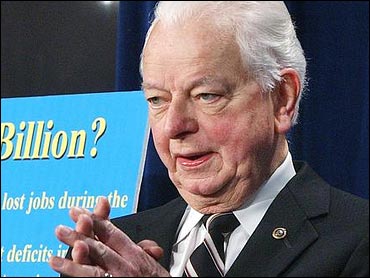Democrats lack votes for health care reform


(Picture from CBS News.)
The reason. Sen. Robert Byrd (right) is fading fast.
He is 91, in-and-out of the hospital, and did not even make his annual "Constitution Day" speech on the floor. Byrd is the "father of Constitution Day," having made September 17 a holiday in a 2004 appropriations bill.
Byrd's last public appearance was crying during floor tributes to Kennedy. His wife passed away in 2006. This is what end of life care looks like.
If Byrd should pass away soon, the Governor has the power to appoint a successor. The present Governor is Joe Manchin, a Democrat who told the party's 2008 convention he supports "health care for every working person."
But West Virginia is changing. It voted for George W. Bush, for John McCain, and gave President Obama one of his worst drubbings of the primary season. Once a union stronghold, its politics are becoming increasingly like those of Alabama. When Democratic strategists talk about an "Appalachian Problem" this is exhibit A.
For now Democrats get by statewide by distancing themselves from their national party. But appointment of a full-throated supporter of "Obamacare" would almost surely trigger a political revolt.
Democrats need 60 votes to pass legislation due to Senate rules. Any Senator can prevent any bill from being voted on unless 60 Senators approve a "cloture" motion to end debate. In recent years these have become routine, although a simple majority could change the rules at the start of any session and do away with the requirement.
Democrats could try to pass a bill under "reconciliation," but that only applies to financial matters, and many parts of the present bill are not financial in nature. Thus a point of order could stop the process and it would have to be overcome by (you guessed it) 60 votes. Without Byrd, Democrats have 59, assuming they can maintain party unity.
Right now, the health care debate is hurting everyone it touches. Approval is down across the board, even for Republicans like Charles Grassley of Iowa. Opinions continue to harden along partisan lines, and while pluralities still support reform, even Snowe might face a tough primary if she crosses her party line.
Liberals feel Snowe is not negotiating in good faith, but since she is negotiating the White House feels it must assume good faith to get a bill.
Right now chances of a bill emerging from Congress are no better than 50-50, and so are Democratic chances of keeping the power they won last year.